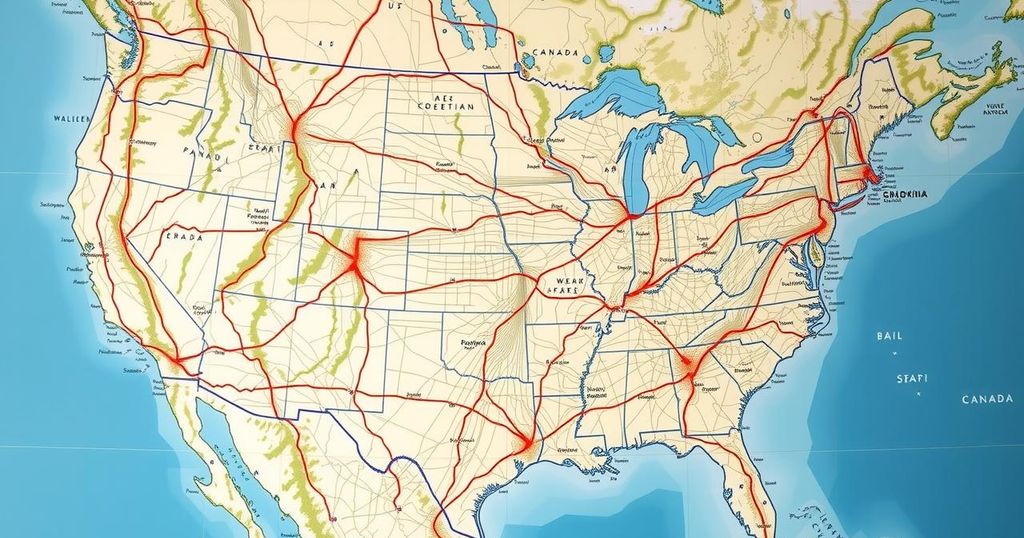Trump’s Provocative Statements on U.S. Expansion into Canada, Panama, and Greenland

President-elect Donald Trump has suggested potential territorial expansion for the U.S. involving Canada, the Panama Canal, and Greenland. His comments raise debates regarding serious policy intentions versus political rhetoric. Responses from Panama and Denmark assert their sovereignty over these regions, reflecting a complex international dialogue as Trump’s administration approaches its term.
President-elect Donald Trump has recently made provocative statements suggesting a potential U.S. territorial expansion, reviving historical aspirations reminiscent of the Louisiana Purchase or the acquisition of Alaska. He has jested about the possibility of Canada becoming the 51st U.S. state, threatened to reclaim the Panama Canal, and reiterated a longstanding interest in purchasing Greenland, a Danish territory. These comments raise the question of whether they reflect serious policy ambitions or are merely strategic provocations designed to garner media attention and energize his political base.
During a speech to conservative activists in Arizona, Trump expressed that the Panama Canal could be reclaimed, offering Panama an incentive to lower passage fees for U.S. ships—his manner suggesting he may employ such rhetoric as negotiation tactics. Similarly, he emphasized the importance of Greenland for national security, invoking a nationalist agenda under the banner of “America First.” His administration’s rhetoric aligns with the 19th-century ideology of Manifest Destiny, advocating for an expansive U.S. presence in the world.
In his remarks, Trump mentioned that designating drug cartels as foreign terrorist organizations could potentially lead to military action in Mexico, a move that could jeopardize diplomatic relations. The origins of Trump’s sudden interest in the Panama Canal are unclear, although trade considerations may have played a significant role, particularly in light of his anticipated tariffs on foreign goods.
Responses from the officials of Panama and Denmark have been dismissive, emphasizing their sovereignty and control over these territories. Panama’s President, José Raúl Mulino, reaffirmed the country’s ownership of the canal and reiterated its successes since it was transferred to Panamanian control in 1999. In Greenland, Prime Minister Mute Egede stated clearly, “Greenland is ours, and we are not for sale and will never be for sale.”
Trump’s comments regarding annexing Canada seem more like political jabs than any credible intention. These statements may serve as negotiating tactics, compelling Canadian and Mexican leaders to engage with his administration as they seek to reaffirm their commitments to U.S. border policies. These developments indicate that Trump’s approach to foreign relations will likely continue to combine rhetoric with bold assertions, causing significant international attention and possibly strained relations with neighboring countries.
The article discusses recent comments made by President-elect Donald Trump that hint at a possible expansion of U.S. territory, including annexation of Canada, declaring ownership over the Panama Canal, and pursuing the acquisition of Greenland from Denmark. These provocative statements raise significant questions about Trump’s foreign policy intentions and what they reflect about his administration’s future dealings with neighbors and allies. The situation is emblematic of an ambitious approach to foreign relations that harkens back to the historical doctrine of Manifest Destiny, emphasizing America’s perceived right to expand its borders and influence.
In conclusion, Donald Trump’s recent remarks about potential U.S. expansion into territories such as Canada, the Panama Canal, and Greenland indicate a complex mix of serious policy initiatives and rhetorical strategies aimed at engaging both domestic and international audiences. The reactions from Panama and Denmark reflect a strong stance against such provocative assertions, underscoring matters of sovereignty and historical treaties. As Trump’s administration prepares to take office, these statements set the stage for an unconventional approach to U.S. foreign policy that may provoke significant discussions and diplomatic challenges in the months ahead.
Original Source: www.cnn.com







